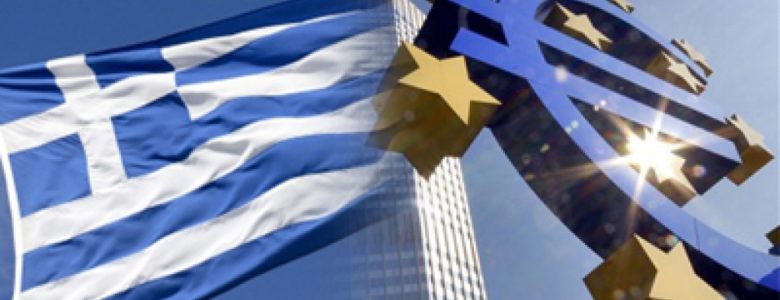
Was the EU's Greek bailout ILLEGAL? Bid to uncover secrets that could BLOW APART eurozone
Here’s a piece that correctly outlines and promotes our #TheGreekFiles campaign – though for the wrong reasons. It was published in a nationalist, Eurosceptic title that sees things very differently to us here at DiEM25, to say the least.
(Clearly, the EU institutions’ failures are so damaging that even those who want to destroy it understand the arguments of those of us who want to save it!)
LEADING European figures have today launched a landmark bid to uncover the murky backroom dealings behind the EU’s controversial bailout of Greece in a move which could deliver another killer blow to the struggling euro.
By Nick Gutteridge, Brussels Correspondent (The Express)
Brussels politicians spearheaded by former Greek finance minister Yanis Varoufakis have ordered eurocrats to release a bombshell secret dossier which shows whether or not their treatment of Athens was legal.
The European Central Bank (ECB) infamously ordered the closure of Greece’s banks at the height of the eurozone crisis in 2015 and would only allow them to reopen once PM Alexis Tsipras agreed to a crushing austerity regime.
But the bank’s president, Mario Draghi, immediately had concerns about the legality of such bullying tactics and commissioned a top lawyer to produce a dynamite report laying out the rules.
That dossier has been kept under lock and key deep in the ECB’s top secret vault ever since, with eurocrats refusing to release it despite the fact it was commissioned using taxpayers’ money.
If it indeed found the Greek bailout was illegal, and that information were to become public, it would do huge damage to the EU’s already battered reputation and spark a governance crisis across the eurozone.
Read the full article here.
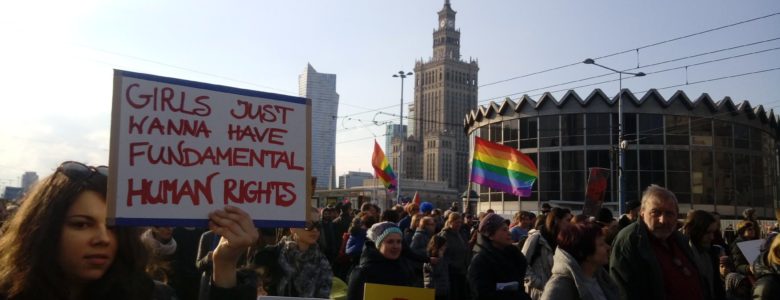
Gender Equality in DiEM25
Our first year as DiEM25 tell a marvellous story of success: DiEM was able to activate over 40.000 members all across Europe to participate in our democratic project. Activists enter their local realms creatively and carry DiEMs messages to the people. In parallel experts and members all over the continent are collaborating on the Progressive Agenda for Europe. Within monthly, sometimes weekly cycles DiEM holds public events. The movement is becoming more visible and gaining traction. We are learning from each other, we are growing and every single one of us is contributing to the success of our common goal: DEMOCRATIZING EUROPE, one day at a time.
As we are realizing our vision and enter wider political arenas, we must also make female voices heard inside DiEM and work towards a Europe of Gender Equality.
The world is suffering setbacks in Gender Politics. The repulsive statements and scandals of the Trump campaign are only one example for this. Poland’s government would like to abolish the already restricted right to safe and legal abortion which thousands of protesters, the black protests, have prevented so far. The German AfD wants to get rid of gender studies altogether and all too often we hear the word Genderwahnsinn – Gender madness.
Genderwahnsinn, i.e. the accusation that defendants of equal rights and opportunities for women and men go too far, is a convenient instrument to discredit those people that, conscious of the alarming treatment of women, campaign for an open and progressive society. The word carries the accusation that their demands are mad, that they complain about negligible issues and distract from topics of greater importance.
Trump’s pussy grabbing scandal, the tightening of abortion laws, a gender pay gap of 20% in Germany or Turkey’s president Erdogan’s methodical displacement of women out of public life do not seem to be enough evidence for those critics that gender equality is a matter of highest actuality and importance. More than that, we observe a systematic discrimination of women and men with regards to combining work and family in the crises of Europe and the established economic and societal structures.
On the occasion of the international women’s day, March 8th, we want to present to you our ideas on the topic of Gender Equality in DiEM25
We are Elisa, Jakob and Sören. We are active DiEM members from three different cities in Germany. In December 2016 we met in Berlin where we held the 1st German wide DSC Assembly. Together with others, we formed an online working group, because we all wanted to contribute to making DiEM more gender equal. Our motivation for the topic was based on a very simple observation: Within the assembly as well as within our DSCs there were many more men than women. Why is that so? Does DiEM speak a masculine language? Are European politics a topic that interests more men than women?
This paper is structured in two parts. Part one reflects on our reality, as well as thoughts on DiEM25’s external and internal communications. In part two we will come up with some constructive ideas and proposals how we can make DiEM a more gender-equal space. In this respect, we intend the paper as a base for discussion on the topic both in the DSCs and for DiEM as whole, and to vocally support gender equality in our Democracy in Europe Movement.
Political and economic decision-making takes place in male-dominated spheres. Past and present stories of German political parties and movements reflect such gender-biased structures. We could go on by adding the field of academia or the private sector. The Gender Pay Gap is a reality. According to recent studies young girls begin to doubt their intelligence in very early stages of their development. Scientists relate that to the (obviously false) stereotype that women are less intelligent than men.[1] If the self-perception of young women is influenced and reproduced by stereotypes and broad disadvantages, how do you break this discriminatory cycle? In these few lines we have tried to give a short impression of what we mean, when we say that social reality reflects patriarchal structures.
But what about DiEM25?
Before we move to that question, we want to highlight, that we reject any essentialist notion of male or female subjects. Such notions reduce the human being to, for example, a specific function or role in society. Such reductionist role models restrict a free development and support hierarchies, like patriarchy as a hegemonial construct. Moreover, women are by no means subordinate in every social relation and neither do men dominate every social relation. Visions for a more gender equal Europe inevitably imply new visions of masculinity. We actually see more varied role models for women than for men nowadays, and note a lack of alternatives to the hegemonic model of the neoliberal professional male breadwinner. Hence, we emphasize the creative potential of difference as sources of inspiration and knowledge.
In its public appearance, DiEM25 seems to communicate in a very masculine language. On a level of imagery, women and men have reported that the image of Yanis on the motorbike on DiEM website did not offer broad potential for identification and even threw some off. While this is superficial on one hand and Yanis Varoufakis considers himself a feminist on the other, it shows that DiEM25 is subject to stereotypes and can take a position towards them to convince more people of the movement.
When Srećko Horvat participated in an event organized by AcTVism Munich in January, he was one of the six male speakers speaking about „Freedom and Democracy“[2].
Where are the female voices in and for our democracy, especially for our progressive version of it?
The performance of DiEM25 in this arena has been commendable: Events from Berlin, Rome, Vienna, Aegina, London and most recently to Amsterdam enjoyed an equal number of male and female speakers.
This is on purpose. The female quota in CC and VC is inscribed in the Organizing Principles, even with the sentence ‘DiEM25 is a feminist movement’. In this respect DiEM25 is far ahead of all [German] parties and most movements.
Judith Meyer
In our local DSCs way more men participate actively. A female member observed that interested women often do not come back a second time. Maybe they were thrown off by a masculine environment? Or is that women have less time for political engagement because they have to work harder or have a family to take care of? Another female member has founded a female sub-group to discuss certain ideas as she sometimes finds it easier that way. ‘When I enter into a public discussion, I often hesitate to ask questions. By the time I would dare to speak the conversation has already moved on. The way I behave contradicts my self-image and yet my female friends make similar experiences. I can only acknowledge that these things are real and that we need to talk about them, especially in DiEM, states another member.
How can we deal with this issue as DiEM? Are these examples only German experiences or do they reflect something more general than that?
In the following part, we want to present a set of strategies to tackle these questions; for DiEM as a whole and for the DSCs. We all agree that criticizing alone does little good. Instead we should go one step further as DiEM and act:
- Content-wise: We think it is of fundamental importance to acknowledge women’s ongoing disadvantages in various realms of society (politics, labour..). This insight should lead to revisiting our policy papers such as the Economic New Deal from a feminist perspective.
- External communications: DiEM’s communications (videos, pictures, article and so on) show more men than women. We propose to actively visualize Gender Equality in DiEM and by doing this, create more potential for identification for diverse people. Some more concrete ideas were: to fill the DiEM YouTube channel with short explanation videos, portraits of members, even a ‘Europeans of DiEM’-Instagram channel and many more.
- Internal communications: Not only for the sake of Gender Equality but also for constructive and efficient communications, we propose, to develop a loose set of guidelines. We think that every member should have the opportunity to raise her voice in DCS meetings. Thereby we acknowledge that everyone has a different way of expressing oneself. It should be the aim of DSC meetings to create an atmosphere that allows for motivation to flourish.
- Talk more about Gender Politics: we propose to organize events, do actions on the topic of Gender. In this context it would be a good possibility to cooperate with feminist groups.
- Intersectionality is an important field for discussion. I.e. overlapping types of disadvantage/discrimination. Who fends for gender equality must be conscious that this by far is not the only form of discrimination.
- Pan- European Gender workgroup: some members form different parts of Europe have already expressed their interest in a European Gender workgroup. By doing this we can improve networking, develop new ideas, put them into praxis and grow as DiEM.
With this paper, we have tried to approach the topic of „Gender Equality in DiEM25“. The topic is of fundamental importance, because reality often diverges from our intention or vision. To build a democratic future, for men, women, for all of us, we need to actively think and live Gender Equality. Until then let us continue to follow the signs, to be open, for new ideas and above all to stand up for equal rights, where they are under attack!
We would like to thank all those that contributed to the work group and the paper so far. We are happy to receive feedback. If you are interested in the topic, you are very welcome to join the European Gender workgroup ([email protected]). The work on this paper has inspired us and brought many new ideas in all directions. We would like to encourage you to do the same, to work on a topic you consider of being important for DiEM.
Carpe DiEM
Featured Image: Tweet by CC member Agnieszka Wísniewska
[1] http://science.sciencemag.org/content/355/6323/389.full
[2] Of course we do not want o offend neither Yanis nor Srećko by this. They both do gorgeous work for DiEM and contribute to the success of our movement.
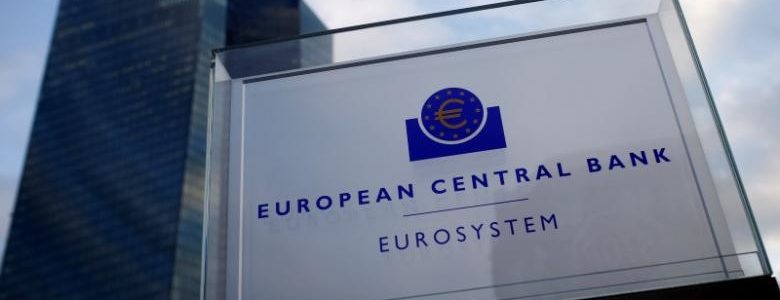
Varoufakis and De Masi clash with ECB on transparency
Greece’s former finance minister, with German MEP, to hold press conference Wednesday, March 8, to announce filing a vital Freedom of Information request to the ECB.
Did the European Central Bank (ECB) act within its mandate when it shut down Greece’s banks in June 2015? Were the ECB’s actions that led to the imposition of capital controls in Greece legal? These are central questions to which DiEM25 co-founder and Greece’s former finance minister Yanis Varoufakis, and Die Linke member of the European parliament Fabio De Masi, want an answer.
The institution led by Mario Draghi was not certain about the legality of its actions at the height of the negotiations between the Greek government and its creditors in the summer of 2015 – to close a member state’s banks – so it commissioned a private law firm to examine whether those actions were legal. When De Masi approached the ECB president to obtain a copy of the private law firm’s legal opinion, Draghi rejected the MEP’s request on the grounds of ‘attorney-client privilege’.
Varoufakis and De Masi have joined forces to take this matter to the next level by filing a Freedom of Information (FOI) request before the ECB to make the legal opinion it commissioned public. The two will hold a livestreamed press conference on Wednesday, March 8 at 10am CET at the European Parliament in Brussels to explain their initiative.
The European people’s right to know
One of the foremost experts on European Law, Professor Andreas Fischer-Lescano, examined whether the ECB was right to refuse to release the private law firm’s opinion. In his view the ECB has no case for withholding from MEPs and the citizens of Europe the legal opinion the ECB secured (and paid for using European taxpayers’ money) regarding its own conduct.
Broad support
Varoufakis and De Masi have secured support for their transparency initiative from a broad alliance of political figures, activists and intellectuals such as French presidential candidate Benoît Hamon and renowned US economists James Galbraith and Jeffrey Sachs. In addition, over twenty thousand people have already signed the online petition launched by DiEM25 to support the FOI request.
#TheGreekFiles Campaign
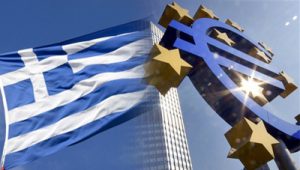
DiEM25 has launched a campaign to support Varoufakis’ and De Masi’s initiative to make this crucial legal opinion public.
In a statement, the pan-European democracy movement explained that because the ECB’s actions in 2015 led to the capitulation of the Greek government in favour of new austerity measures and significant losses of national sovereignty, the power of the ECB to shut down a member state’s banks in today’s Eurozone raises important questions about the democratic nature of our common institutions.
“We must all throw light on the lawfulness and propriety of ECB decision-making – beginning with this case – to give European democracy a chance, as well as to make the ECB less vulnerable to power politics,” the statement said.
Varoufakis – De Masi Press Conference
- WHEN: Wednesday, March 8, 2017 ( 10:00 – 10:30 CET )
- WHERE: Anna Politkovskaya Room, PHS 0A50 – European Parliament (Brussels)
- RSVP: [email protected]
- VIDEO NOW AVAILABLE: https://goo.gl/pyXkc8
#TheGreekFiles – Resources
- CAMPAIGN SITE: https://mera25.it/thegreekfiles
- PETITION: http://www.change.org/thegreekfiles
- VAROUFAKIS VIDEO: https://www.youtube.com/watch?v=Qttt9OHiGG8
- DE MASI VIDEO: https://www.youtube.com/watch?v=eFIvxYWbkfU
- BACKGROUND INFORMATION: https://goo.gl/ndJWje
- MEDIA INQUIRIES: [email protected]
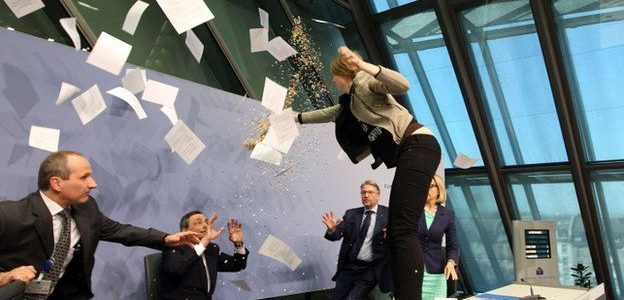
25M: launch of our European New Deal in Rome
And yet there is a third space beyond them. On March 25, the day of an extraordinary European Council in Rome, we will strongly intervene in public discourse and media, launching a cultural and political path that will embrace the whole 2017.
In an important evening of political theater, we will present our European New Deal containing proposals capable of saving Europe from itself and we will begin building a progressive international alliance to take them forwards.
We will do it with a fantastic participation: from Yanis Varoufakis to director Ken Loach, from cofounder of Podemos Juan Carlos Monedero to mayor of Naples Luigis de Magistris, and many others.
Find out more and reserve your free place in the theatre at: www.iltempodelcoraggio.it/en – and donate to the costs at https://internal.diem25.org/en/donations/to/rome.
Find the event on Facebook!
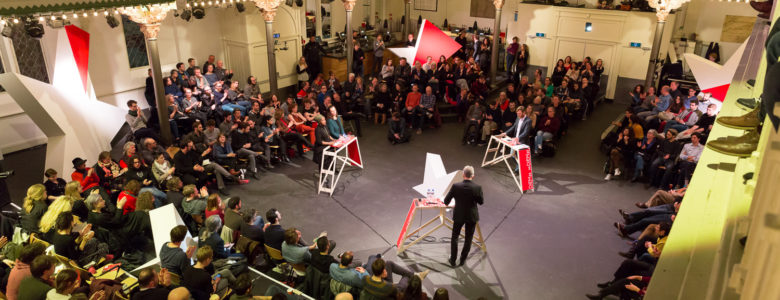
New Unions: DiEM25
Speech by Dutch visual artist Jonas Staal during DiEM25’s official launch in the Netherlands on February 26, 2017.
Thank you for letting me share a few words with you tonight on art and DiEM25.
It has been a great pleasure to have worked this past period with DiEM25 organizers and representatives, Yanis Varoufakis, Lorenzo Marsili, Srećko Horvat, as well as Menno Grootveld from DiEM25 in the Netherlands.
Particularly I would like to thank artist Danae Stratou for putting art at the heart of this movement, as well as curator iLiana Fokianaki of State of Concept in Athens who made this dialogue with DiEM25 possible.
I speak also on behalf of my colleagues, architect Paul Kuipers, designer Remco van Bladel, my team members Younes Bouadi, Renée In der Maur, Evelien Scheltinga, as well as contemporary art center BAK, basis voor actuele kunst that joined the effort with its research on art’s role within this movement. All together we have created the design for this assembly.
The stars you see surrounding us, are the stars of the European Union, changing color. No longer do they stand in a circle: In this time of crisis they are changing constellation, seeking new relations and alliances with one another, just as we try to create new alliances through this assembly today.
The red wedges of the DiEM25 symbol, designed by composer Brian Eno, are surrounding these stars, reconstructing them, challenging them, changing their form and shape. These stars for us stand for a new union to come, a new union in the making. A new union that we discuss here today based on DiEM25’s European New Deal.
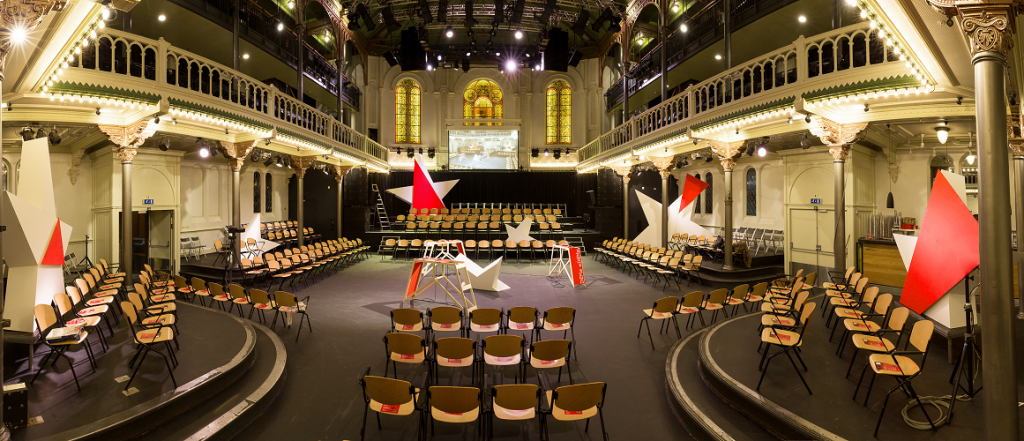
Assembly design for DiEM25’s launch at “Paradiso,” Amsterdam’s premier concert hall and cultural center.
The past years, we keep hearing there are only two options: to be “in,” or to be “out” of the European Union: the “out” camp has been claimed by ultranationalists and fascists, that which DiEM25 calls the “Nationalist International”; while the “in” camp has been claimed by the Eurocratic financial elite, that which DiEM25 terms the “Austerity Union”. The “in” and “out” camps seem to be opposing forces, but as Yanis Varoufakis has argued, they only strengthen one another and deepen our current crises.
Faced with these crises, it is crucial to reclaim our political imagination; our lives are about more than simply being “in” or “out”, than being “us” or “them”: we need a third option. Not just the union as it is, but a union as it could be, a union as it should be, a union as we desire it to be.
This for me is DiEM25. Not a dichotomy of “in” or “out”, but a collective investment in the imagination of a new union that will be. A union based on fundamental democratization, a union as a social project, a union based on transnational solidarity. DiEM25 refers to this as the “Progressive International” or the “Progressive Transnational.”
We are nearing the Dutch election on March 15. It might be the first election in the history of this country in which an ultranationalist party, the so-called Freedom Party (PVV), could become the largest party based on a platform of extreme nationalism and structural racism.
Are we going to be the generation that will allow this? Will we be the ones that allow the mantra “never again” to become yet again…?
Let’s not treat tonight as just another debate amongst many, because now must be our moment. Now must be the moment where we say collectively: not on our watch.
This is the time where we have to mobilize and campaign and vote so progressive Dutch parties will have key roles in forming our next government.
And this is the time in which we must look further than our national elections as well, for they alone cannot solve the global crisis we are part of. We can do that by becoming members of DiEM25, by mobilizing and campaigning for DiEM25, to make a new transdemocratic union a reality.
Not just a union. Our union.
Jonas Staal is artist and founder of the artistic and political organization New World Summit and the New Unions campaign, through which he collaborates with DiEM25 on the role of art in political assembly
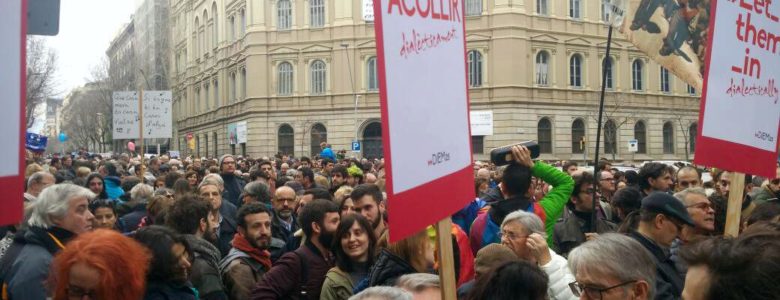
Barcelona – a city rallies for refugees
Last Saturday afternoon in Barcelona was momentous. A third of a million people came together to protest in our streets. It was the biggest march seen in Barcelona since the Iraq War demonstrations, almost fourteen years ago.
The march has been plotted out from Barcelona’s heart to its shoreline, but even before we start moving the throng has pushed the van halfway to the sea – and it takes 2 hours before we’re able to move at all. Grandparents hoist up children, friends dance to nearby drumming, strangers chat to us and then snap selfies holding our freshly made red-and-white DiEM placards. Our DSC is part of the murmur that’s been building in the city for a long time. On this Saturday, no matter from where we’ve come in Catalonia, we’ve all been adopted as “rebel citizens” of Barcelona.
We’re here to demand an end to the deliberate stalling of the Spanish government in taking in its initial pledge of 17,000 refugees: almost two years on, only one thousand people have been allowed inside these borders.
We’re here because we know it is our right and our duty to demand accountability from a government that is shilly-shallying about a matter of life and death: it has emerged that the government has used EU funds allocated to taking in refugees for building detention centres and carrying out deportations instead.
We’re here for Shabbir, and the nameless thousands like him. There in the crowd, we’re acutely aware of our togetherness and can feel the connection stretch across our sea to those standing on other shores.
Our column echoes many others that have been moving Westward and Northward only to be met by barbed wire and military-grade fences. But from this Saturday on, our voices will not die down until our ranks unite. Until those we have given our word to are here with us.
#StopTheDeal
Sign the petition: Save Shabbir and #StopTheDeal between the EU and Turkey
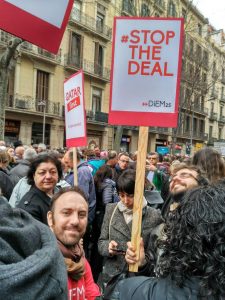
Barcelona1DSC
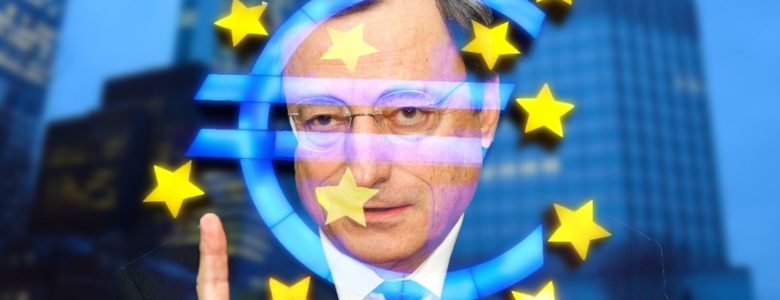
Mr Draghi, what are you afraid of?
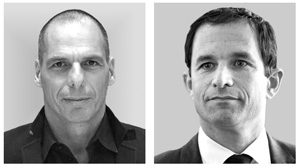
Yanis Varoufakis | Benoît Hamon
(DiEM25, former Greek finance minister / Socialist Party candidate for the Presidency of the French Republic)
In 2015, the European Central Bank (ECB) forced Greece’s banks to close as part of the attempt by the troika of its official lenders (the ECB, the European Commission and the International Monetary Fund) to prevent the newly-elected Greek government from doing what it had been voted in to do: renegotiate the country’s public debt, fiscal policy and reform agenda.
Following the closure of the banks, capital controls were imposed on Greece. These are still in place, with widespread social and economic costs for its already-ailing economy.
We know the ECB commissioned a legal opinion on the legality of those actions. And we want to read that opinion, but the ECB refuses to make it public.
Mr Draghi, if you acted legally, according to EU Law and the ECB charter, why do you not release the legal opinion you commissioned over the ECB’s actions that led to the closure of Greece’s banks?
We pose this question because the ECB has the exorbitant power to close a Eurozone country’s banks. Exercising this power with decisions made behind closed doors by unelected officials is inconsistent with European democracy. The least Europeans can expect is access to legal opinions that they have paid for regarding the exercise of the ECB’s enormous power. Your refusal, Mr Draghi, to grant citizens access to such legal opinions enrages Europeans and is a great gift to the forces of the Nationalist International inimical to the European Union.
Democracy and transparency are not luxuries. They are essential for Europe’s survival. To this effect, a broad alliance of politicians and academics have announced they will support a mass freedom of information request to the ECB, to be submitted by Yanis Varoufakis (DiEM25) and Fabio De Masi (MEP, GUE/NGL), demanding the publication of the ECB’s legal opinion. We call upon democrats, wherever they may live and irrespectively of their party’s political allegiances, to support this mass freedom of information request by signing DiEM25’s petition.
This campaign is just the beginning of a long struggle for transparency and democracy in Europe.
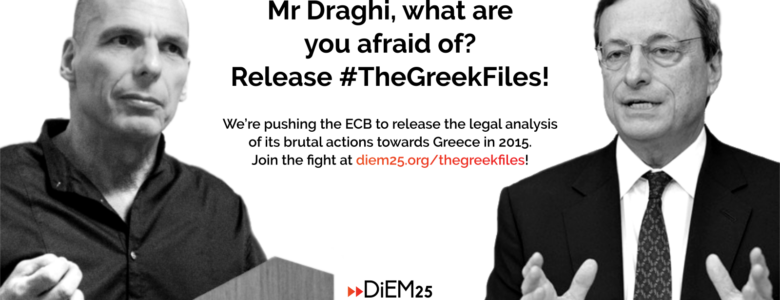
Mr Draghi, what are you afraid of? Release #TheGreekFiles!
Today, DiEM25 is launching a petition to support a mass freedom of information request for legal documents on the ECB’s closure of Greece’s banks in 2015.
In 2015, the ECB closed Greece’s banks as part of the troika’s attempt to intimidate the newly-elected Greek government into abandoning its mandate for a renegotiation of Greece’s public debt, fiscal policy and reform agenda with the troika of creditor institutions (EC-ECB-IMF). At that time, the ECB commissioned a legal opinion on the legality of its actions which it is refusing to make public!
Yanis Varoufakis (DiEM25) and Fabio de Masi (MEP, GUE/NGL) have announced they will file a mass freedom of information request to the ECB to release the withheld legal opinion. DiEM25 is today launching a petition to gather signatures to support this freedom of information request.
Watch Yanis explain the campaign in this three-minute video, visit our campaign page, and sign the petition!
This campaign is just the beginning of DiEM25’s long struggle for transparency and democracy in Europe. If the ECB denies this request to release #TheGreekFiles, Varoufakis and De Masi will consider all options – including legal action – to make this vital information public.
The petition is sponsored by an broad coalition of politicians and academics, including Benoît Hamon, the Socialist Party’s candidate for the French Presidency in 2017.

Our petition is supported by Benoît Hamon, Katja Kipping and Gesine Schwan, among others
DIEM25’S PETITION IS SPONSORED BY:
- Benoît Hamon, Socialist Party candidate for the French Presidency, 2017
- Katja Kipping, Co-Chairperson, Die Linke, Germany
- Gesine Schwan, President, Viadrina European University and twice the SPD’s candidate for the Presidency of the Federal Republic of Germany
- Fabio De Masi, MEP GUE/NGL (TW / FB) and supporters
- Yanis Varoufakis, co-founder of DiEM25 and former Greek finance minister
With the support of university professors including
- Klaus Dörre, Friedrich-Schiller-Universität, Jena
- James K. Galbraith, University of Texas at Austin
- Rudolf Hickel, Bremen Universität
- Gustav A. Horn, Hans-Böckler-Stiftung
- Aidan Regan, University College Dublin
- Jeffrey Sachs, University of Columbia
- Joseph Vogl, Humboldt Universität
- Arthur Gibson, University of Cambridge
Sign our petition at http://change.org/thegreekfiles
or learn more at https://mera25.it/thegreekfiles!
![]()
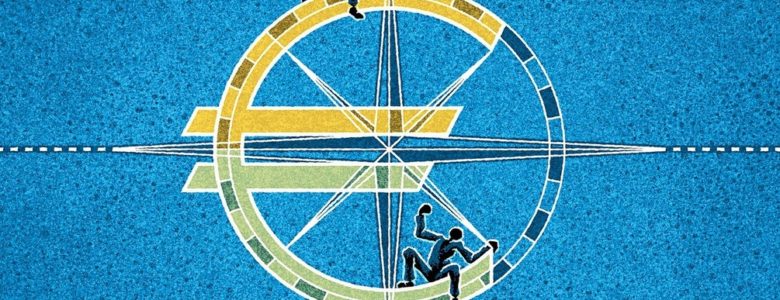
DiEM25 Unveils Its 'European New Deal: An Economic Agenda for European Recovery’
DiEM25’s paper entitled ‘European New Deal: An economic agenda for European Recovery’ will be launched on the 25th March 2017 in Rome, in the context of the 60th anniversary of the Treaty of Rome. The full version of the paper will be made public before that event to prepare the deliberations that will take place in Rome.
>> DiEM25’s European New Deal – A Summary
The idea of Europe is in retreat and the European Union is at an advanced state of disintegration.
With Brexit, one great pillar of the European Union has already fallen. Others may follow – if not in this year’s election cycle then perhaps in the next.
“I don’t care what it will cost. We took our country back!” This is the proud message of Brexit supporters. It is also an aspiration that we begin to encounter everywhere in Europe, even amongst left-wingers advocating a return to the nation-state.
So, is Europe a lost cause? Can it be saved? Should it be saved?
DiEM25 believes that we, the peoples of Europe, must take our countries back. Indeed we need to take our regions back. We need to take our cities and towns back. But to take back our countries, our regions and our cities, we need to reclaim common purpose amongst sovereign peoples. And to do this we need an internationalist, common, transnational European project. We need a European New Deal. This document outlines just that.
Click here to read the entire summary